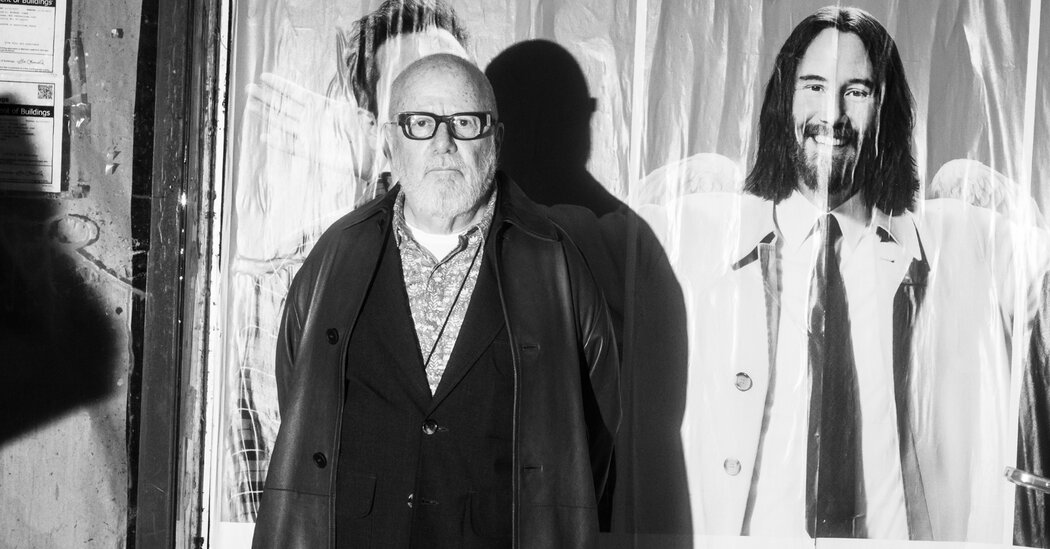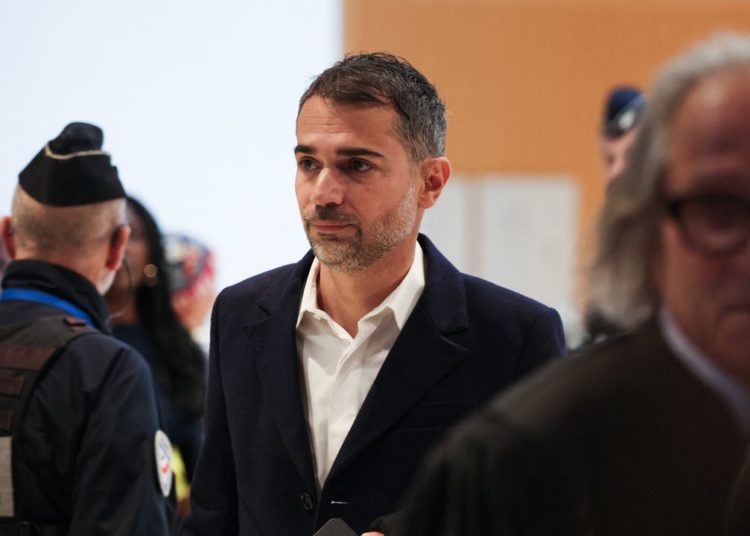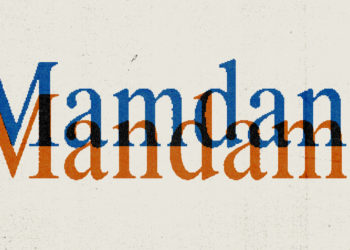Keanu Reeves made his film debut 40 years ago in a little movie called “One Step Away.” before becoming an international superstar in franchises like “Bill & Ted,” “The Matrix,” and “John Wick.” Critics have not always been kind along the way, critiquing his accents, his delivery and his casting.
Yet, there are some who have seen a deeper pattern in the pathos of Mr. Reeves’s work, and have said that his patented low-affect blank-stare, and decidedly dude-like approach, were all actually the work of a very good — nay, most excellent — actor.
“I had to see several performances to see that there was something quite idiosyncratic about his performances,” said Stephen Prina, a noted proponent of this interpretation. “They always seemed reticent. It wasn’t about disclosure; it was about kind of a withdrawal.”
For the unacquainted, Mr. Prina is an acclaimed poly-hyphenate — musician, composer, artist — who is also a devoted Keanuophile, able to fluently cite many selections from Mr. Reeves’s résumé of more than 70 films.
Indeed, long before Mr. Reeves, 61, decided to make his Broadway debut in Samuel Beckett’s “Waiting for Godot,” a commercial smash which opened last month, Mr. Prina earned a quick dash of fame for one of the earliest, and most earnest examinations of the actor’s artistry.
The occasion was a 1994 seminar Mr. Prina taught at ArtCenter College of Design in Pasadena, Calif., a course that caught the attention of The New Yorker’s Susan Orlean, who called it “twelve gnarly weeks of culture, sociology, anthropology, and philosophy.”
“Plus,” Ms. Orlean quipped, “there’s, like, a lot of homework.”
Three decades have lapsed since that pass-fail class. But Mr. Reeves and Mr. Prina’s careers have now nearly converged again, this time in midtown Manhattan, with the movie star treading the boards at the Hudson Theater on West 44th St. and Mr. Prina celebrated during a three-month residency and retrospective at MoMA, nine blocks to the north.
Mr. Prina, no ordinary fanboy, is an aficionado of high-and-low culture able to weave connective tissue between Mr. Reeves and the likes of philosopher Michel Foucault, the sociologist Richard Sennett, and Teen Beat magazine, all of which were required reading in his 1994 class. Mr. Prina posits, for example, that some of Mr. Reeves’s early film acting was influenced, in part, by Bertolt Brecht’s theory of “alienation,” putting the audience at a remove from the play’s emotions.
“As if he were quoting,” Mr. Prina explained. “Or that he knew what the outcome would be in advance.”
Sitting with a reporter before the “Godot” curtain, Mr. Prina, 70, said his lifelong affection for Mr. Reeves, dated to the 1986 thriller, “Rivers Edge,” about a group of teenagers dealing with a murder in their midst.
Of course, Mr. Prina saw “Speed” and “Point Break,” and was a “Matrix” fan. (“Wasn’t everybody?” he said). But his appreciation also includes deep tracks like, “The Last Time I Committed Suicide,” a Kerouac-era caper from 1997, in which Mr. Reeves gained gobs of weight — bulking up to 200 lbs. — to play the role of a dissolute hipster.
“I thought, this is perfect casting because it is the perfect image of the golden boy who has gone sour,” Mr. Prina said.
Still, despite his assiduous study of Mr. Reeves’s craft, even Mr. Prina said he was surprised when he heard about the actor doing Beckett. But he was willing to see what Keanu could do.
“I thought, ‘OK, you want to go there?’ I’m willing to go with him to see what happens with it,” he said.
So it was that the auteur did exactly that, attending a recent performance of “Godot,” which also stars Alex Winter, the Bill to Mr. Reeves’s Ted in their three time-traveling movies. (And perhaps a fourth.) Mr. Reeves and Mr. Winter had prepped for their roles by touring Beckett archives, talking to Beckett scholars and memorizing Beckett’s often repetitive and cryptic lines, including more than a few that seemed almost written for them.
“We should have thought of it a million years ago, in the nineties,” says Vladimir, played by Mr. Winter, to Estragon, played by Mr. Reeves, early in the play. “We were respectable in those days.”
Mr. Prina said his fascination with Mr. Reeves was codified in 1991 with “My Own Private Idaho,” in which the actor played a young hustler from a good home, and got good reviews, opposite River Phoenix, in a script that drew from Shakespeare’s “Henry IV” and “Henry V” plays.
“Everybody raved about River Phoenix’s performance, as they should: It’s a traditional kind of method acting, you know, becoming the character,” he said.
“But Keanu’s part, I think, was much more difficult,” he continued, saying Mr. Reeves was simultaneously playing the role in several styles, including naturalistically as well as “delivering Shakespeare with a valley-dude perspective.”
“When people aren’t familiar with Brechtian’s strategic strategies in the theater they think that’s bad acting,” he concluded. “Well no. It’s a choice.”
For his part, Mr. Reeves said in a statement that had a recollection of hearing about Mr. Prina’s 1994 class, but has not seen Mr. Prina’s work.
But, he said, he “will definitely check them out.”
The critics have had mixed things to say about the Broadway production, though many have been impressed by Mr. Winters and Mr. Reeves’s lasting camaraderie.
Sure enough, for a show about a pair of downcast clowns trapped in an endless cycle of existential dread, this “Godot” can be surprisingly warm-and-fuzzy, including sweet hugs and a much discussed moment in the second act when Vladimir and Estragon do a Bill-and-Ted takeoff by playing air guitar, a moment that Mr. Prina liked.
“I guess the purists are going ballistic over that one, but I thought why miss the opportunity?” said Mr. Prina of the air guitar, adding, “You’re not going to see it in any other production of this play.”
Mr. Prina, himself, played in the experimental punk band Red Krayola for a decade, and in his own shows, including a recent revival of “Beat of the Traps” at MoMA in September. That show had a certain surreal Samuel Beckett feel to it, too, with a pair of wailing hard-rock drummers and an aged vaudevillian in green sequins.
After the final curtain at “Godot,” Mr. Prina said he needed a day or two to gather his opinions on the show. And his eventual critique, not surprisingly, was deeply thought out, mentioning, among other things, the opera, “Moses und Aron” by Arnold Schoenberg in reference to “Godot”’s Christian overtones.
He seemed to like the production — “Much to recommend,” he said — he remained impressed by Mr. Reeves’s ability, after so many decades and so many righteous roles, to surpass people’s expectations.
“I think there has been that element of surprise in how he shows up in these different contexts, and I don’t think that that is an accident,” Mr. Prina. “It’s all one of a piece.”
Jesse McKinley is a Times reporter covering politics, pop culture, lifestyle and the confluence of all three.
The post He Taught a Class on Keanu Reeves in 1994. What Does He Think of ‘Godot’? appeared first on New York Times.




